▼ US appoints Indian American ambassador [06-30-17]
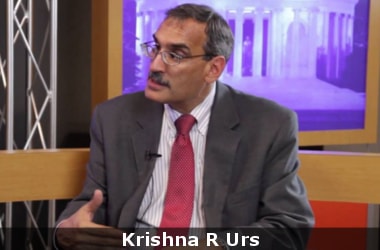 U.S. President Donald Trump has appointed an Indian-American named Krishna R Urs as the new US Ambassador to Peru. U.S. President Donald Trump has appointed an Indian-American named Krishna R Urs as the new US Ambassador to Peru.
Krishna R Urs is a career service American diplomat who has served at seven US embassies as well in several senior leadership positions in Washington, DC.
At present, he is serving as Charge d’ Affaires of the US Embassy in Madrid, Spain.
Earlier, he has also served as Deputy Assistant Secretary for Transportation Affairs and Chief US Government Aviation Negotiator at the Department of State (2010 to 2014)
Krishna R Urs has specialisation in economic issues and has extensive policy experience in the Andean region of South America.
He had earned his MS from the University of Texas and a BS from Georgetown University.
|
▼ Mihai Tudose is Romania's PM [06-29-17]
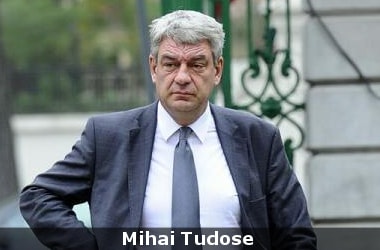 Romanian President Klaus Iohannis on 26 June 2017 appointed Social Democrat Mihai Tudose as the Prime Minister and mandated him to form a new government. Romanian President Klaus Iohannis on 26 June 2017 appointed Social Democrat Mihai Tudose as the Prime Minister and mandated him to form a new government.
Tudose was officially validated as proposal for the Prime Minister office by the National Executive Committee convention of the main ruling Social Democratic Party (PSD).
Tudose now has 10 days to win over Romania’s parliament with a vote of confidence in his proposed cabinet and policy programme.
Tudose was one of the potential candidates for Prime Minister brought forward by the majority coalition led by the Social Democratic Party to succeed Sorin Grindeanu after the latter was dismissed by a motion of no confidence adopted in Parliament by his own party.
Mihai Tudose: Know More
- Born on 6 March 1967, Mihai Tudose is a Romanian politician, deputy in the Parliament of Romania, Minister of Economy in the ousted Grindeanu Cabinet and the Prime Minister-designate of Romania.
- On 26 June 2017, the majority coalition nominated him for the position and President Iohannis designated him as the PM of the country.
- He is expected to take office on 29 June 2017.
|
▼ Macron's En Marche wins parliamentary majority [06-21-17]
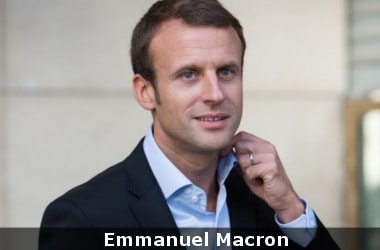 French President Emmanuel Macron’s En Marche has won a clear parliamentary majority in the 2017 legislative elections, just weeks after his own presidential victory. French President Emmanuel Macron’s En Marche has won a clear parliamentary majority in the 2017 legislative elections, just weeks after his own presidential victory.
With nearly all votes counted, Macron’s En Marche alongside its Democratic Movement (MoDem) allies, has won more than 300 seats in the 577-seat National Assembly.
The party was formed just over a year ago on 6 April 2016 and around half of its fielded candidates have little or no political experience.
The La République en Marche along with MoDem has surpassed the required the 289-seat mark to control the National Assembly, delivering a huge blow to traditional parties on both the left and right.
The winning margin is however, lower than expected, with the total turnout hitting a record low, down by about 42% from 2012.
The conservative Republicans and their allies could form a large opposition block with 125-131 seats, which in comparison to the last parliament is down from 200.
Though Marine Le Pen’s far right political party - the National Front (FN) - performed worse than expected by getting just 8 seats in comparison to their expected 15, Pen won a seat in the parliament for the first time representing Henin - Beaumont town.
The Socialist Party (PS), which was in power since the past 5 years along with their ally the Radical Party of the Left (PRG), are looking set to get only 41-49 seats, their lowest tally ever.
The defeat has led the Socialist party leader - Jean-Christophe Cambadelis- who lost in last week’s first-round vote, to announce his retirement from the post.
The result gives the young French President a strong mandate in parliament to pursue his pro-EU, business-friendly reform plans.
En Marche: Know More
- President: Catherine Barbaroux (Acting)
- General Secretary: Richard Ferrand
- Founder: Emmanuel Macron
- Founded: 6 April 2016
- Headquarters: 99, rue de l'Abbé-Groult
- 75015 Paris
- Youth wing: Les Jeunes avec Macron
- Ideology: Liberalism, Social liberalism, Economic liberalism, Pro-Europeanism
- Political position: Centre
- National Assembly: 308 / 577
|
▼ UK, France to combat terror online [06-16-17]
 The leaders of France and Britain have announced an anti-terror action plan to stop terror propaganda on internet. The leaders of France and Britain have announced an anti-terror action plan to stop terror propaganda on internet.
The announcement was made by French President Emmanuel Macron after having talks with British Prime Minister Theresa May.
Both the countries agreed that social networks were not contributing enough to weed out extremist elements and put a stop to terror propaganda.
One of the key measures of the action plan would be to prevent the incitement of “hate and terrorism” on the internet.
Both France and UK agreed that more should be done to tackle the terrorist threat online.
The main objective of the action plan is to ensure the internet cannot be used to host the radicalising material that leads to much harm.
The British government has already started working with social media companies to halt the spread of extremist material and poisonous propaganda that aims to corrupt young minds.
British Prime Minister Theresa May also confirmed the cooperation between the two nations by saying that the UK and France will be working together to encourage organisations to do more and abide by their social responsibility to step up their efforts to remove harmful content from their networks.
Though no such parameter has been decided upon as yet, the campaign does explore the possibility of imposing legal penalties against the tech companies that fail to take the necessary action to remove unacceptable content from their social media site.
The United Kingdom recently faced one of the most shocking terror incidents when a suicide bomber detonated explosives at a pop concert by American singer Ariana Grande on 22 May 2017. The incident followed by a knife and van attack in central London that left eight dead.
France has been a constant target for jihadist attacks since 2015.
|
▼ Six countries cut ties with Qatar [06-7-17]
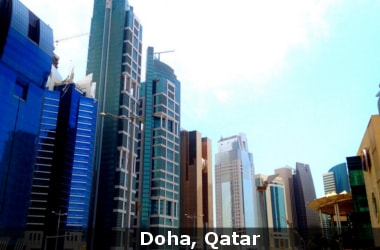 Six countries of the Arab region, Saudi Arabia, United Arab Emirates (UAE), Bahrain, Yemen, Libya and Egypt have cut off their diplomatic ties with Qatar. Six countries of the Arab region, Saudi Arabia, United Arab Emirates (UAE), Bahrain, Yemen, Libya and Egypt have cut off their diplomatic ties with Qatar.
The countries have all accused Doha for destabilising the region and have declared that they would not be maintaining any diplomatic relations with the nation with immediate effect.
Saudi Arabia’s capital city, Riyadh has closed its borders, severed land, sea and air contact with Doha. This step has been taken to protect the national security of the Kingdom from the dangers of terrorism and extremism.
UAE has given Qatari diplomats 48 hours to leave the country. Abu Dhabi accused Doha of supporting, funding and embracing terrorism, extremism and sectarian organisations.
Bahrain also announced cutting diplomatic ties citing ongoing attempts to destabilize security in the kingdom. It blamed Qatar’s support for armed terrorist activities and funding linked to Iranian groups to carry out sabotage, for its decision.
Egypt has also closed its airspace and ports for all Qatari transportation. The Egyptian Foreign Ministry in a statement said that it is severing diplomatic relations with Doha because of the continued hostility of its authorities towards Egypt.
The Yemen government also announced snapping ties with Qatar accusing it of working with its enemies of the Iran-aligned Houthi militia.
The Tobruk-based internationally recognized government of Libya also broke off diplomatic relations with Qatar. Foreign Minister Mohammed Dairi stated that Doha has been the main source of supplying weapons to the Libyan branch of the Muslim Brotherhood and other armed Islamist groups since 2012 and poses a threat to the national security of the Arab world.
The Saudi-led Arab coalition fighting Yemen’s Houthi rebels have also expelled Qatar from its alliance. Qatar Foreign Ministry on the hand has expressed regret on the decision of the Arab countries to cut off diplomatic ties.
Qatar: Know More
- Capital: Doha
- Dialing code: +974
- Currency: Qatari riyal
- Drives on the: right
- Ethnic groups (2010): 40% Arab; 18% Indian; 10% Iranian; 8.5% Pakistani; 14% Other
- GDP (PPP): 2017 estimate
|
▼ UNSC council adds 4 more nations [06-7-17]
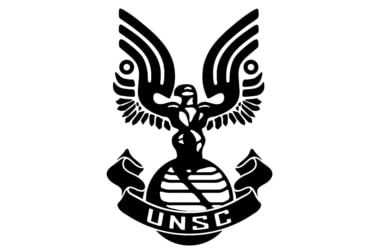 The 193 members of the United Nations General Assembly in the last week of May 2017 elected Sweden, Bolivia, Ethiopia and Kazakhstan. The 193 members of the United Nations General Assembly in the last week of May 2017 elected Sweden, Bolivia, Ethiopia and Kazakhstan.
The countries will serve on the world body’s Security Council for a period of two years, starting from 1 January 2017.
After rounds of voting at the United Nation Headquarters in New York, only one non-permanent Council seat remains to be filled.
Italy and the Netherlands had been vying for the remaining seat. However, the voting yielded no clear winner. The two countries then suggested sharing the two-year term, each with a one-year period.
At the election, the General Assembly members voted by secret ballot for five seats divided by geographical grouping: two from Africa and the Asia-Pacific region, two from the Western Europe and Others Group, and one from Latin America and the Caribbean.
Bolivia and Ethiopia were chosen by their regional groups and had no competitors. Kazakhstan won the seat reserved for Asia Pacific against Thailand, while Italy, the Netherlands and Sweden had competed for two seats for Western Europe.
The newly-elected countries will replace Spain, Malaysia, New Zealand, Angola and Venezuela.
UNSC: Know More
- The United Nations Security Council is one of the six principal organs of the United Nations.
- It is charged with the maintenance of international peace and security as well as accepting new members to the United Nations and approving any changes to its United Nations Charter.
- Its powers include the establishment of peacekeeping operations, the establishment of international sanctions, and the authorization of military action through Security Council resolutions.
- The Security Council held its first session on 17 January 1946.
- The 5 permanent members, each with the power of veto, are China, France, Russia, the United Kingdom and the United States.
|
▼ Leo Varadkar is Ireland's first Indian origin PM [06-5-17]
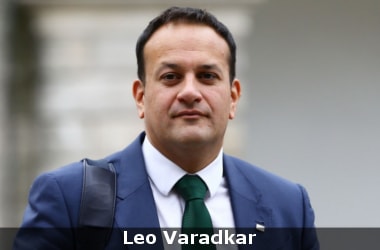 Ireland’s governing Fine Gael party elected Leo Varadkar as its new leader on Friday, choosing the gay, 38-year-old son of an Indian immigrant to succeed Enda Kenny as prime minister in a striking sign of the country’s rapid social change. Ireland’s governing Fine Gael party elected Leo Varadkar as its new leader on Friday, choosing the gay, 38-year-old son of an Indian immigrant to succeed Enda Kenny as prime minister in a striking sign of the country’s rapid social change.
Varadkar overcame ministerial colleague Simon Coveney as expected, winning an overwhelming majority among the centre-right party’s lawmakers, who hope the straight-talking Dubliner can lead them to third successive term for the first time.
Barring an unexpected development, Varadkar will be voted in as prime minister when parliament next sits on June 13 and become the once-staunchly Catholic country’s first openly gay premier and the youngest person ever to hold the office.
His election marks another chapter in the social change that has swept through the country of 4.6 million people that only decriminalised homosexuality in 1993 but became the first country to adopt gay marriage via a popular vote in 2015
It also shows another face of modern-day Ireland.
Varadkar’s father Ashok, who like his son is a doctor, was born in Mumbai in India.
|
▼ Egypt president cracks down on NGOs [06-2-17]
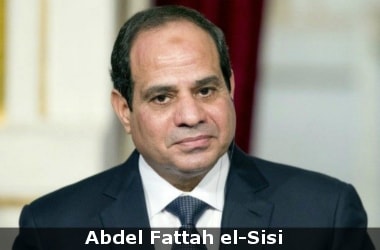 Making it harder for charities to operate in Egypt, President Abdel Fattah el-Sisi on 29 May 2017 signed into law a contentious new bill that regulates non-governmental organisations (NGO). Making it harder for charities to operate in Egypt, President Abdel Fattah el-Sisi on 29 May 2017 signed into law a contentious new bill that regulates non-governmental organisations (NGO).
The measure restricts NGO activity to developmental and social work and introduces jail terms of up to five years for non-compliance and fines up to one million Egyptian pounds (more than $55000).
Under the new law, foreign non-governmental groups will have to pay up to 16500 dollars to start working in Egypt and renew their permit on a regular basis.
It has also a provision of a national authority including army and intelligence representatives to oversee the foreign funding of Egyptian non-governmental organisations and the activities of foreign non-governmental organisations.
The new law says that no organisation will be allowed to carry out or publish the results of a study or survey without prior permission from the state.
The law came into force on 30 May 2017 in Egypt after being published in the official gazette. It was approved by the President, six months after it was passed in the Parliament.
In addition to this, all NGOs or any other entity engaged in social work will have one year from 30 May 2017 to register in accordance with the still to be formed National Authority for the regulation of foreign NGOs.
Egypt: Know More
- Capital: Cairo
- Dialing code: +20
- Currency: Egyptian pound
- Capital and largest city: Cairo
- President: Abdel Fattah el-Sisi
|